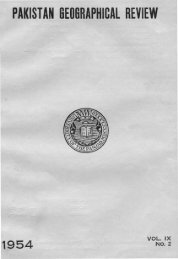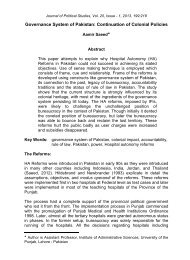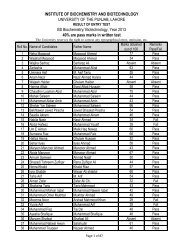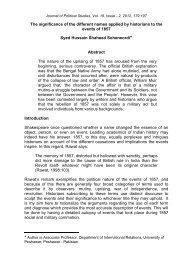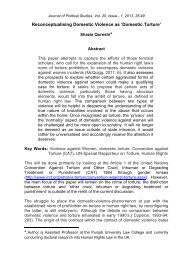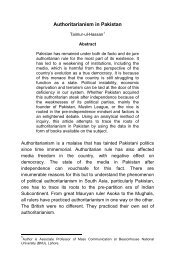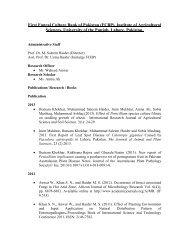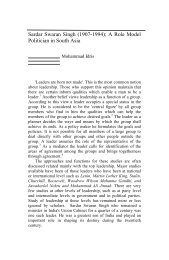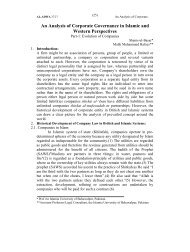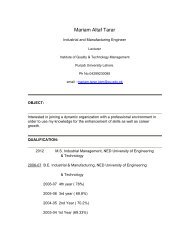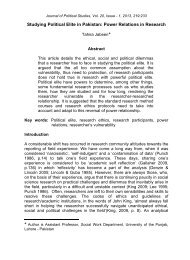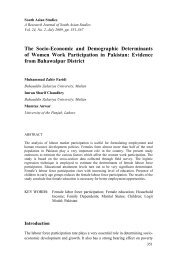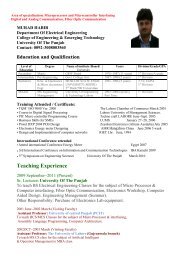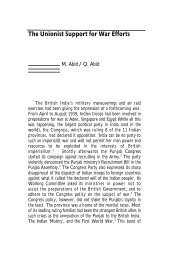Can Pakistan be a Secular State? - University of the Punjab
Can Pakistan be a Secular State? - University of the Punjab
Can Pakistan be a Secular State? - University of the Punjab
You also want an ePaper? Increase the reach of your titles
YUMPU automatically turns print PDFs into web optimized ePapers that Google loves.
Muhammad Imtiaz Zafar<br />
<strong>Can</strong> <strong>Pakistan</strong> <strong>be</strong><br />
<strong>the</strong> French Revolution, Christian thought has <strong>be</strong>en powerfully influenced by <strong>the</strong><br />
sense <strong>of</strong> <strong>the</strong> strength <strong>of</strong> <strong>the</strong> secularizing forces in <strong>the</strong> world and most <strong>the</strong>ologians<br />
and church leaders have <strong>be</strong>en aware <strong>of</strong> <strong>the</strong> need to respond to this threat. Four<br />
characteristic strategies, so far, have <strong>be</strong>en witnessed. Firstly, partial acceptance <strong>of</strong><br />
contemporary critiques <strong>of</strong> Christianity and <strong>the</strong> church, and restatement <strong>of</strong> <strong>the</strong> faith<br />
or <strong>of</strong> <strong>the</strong> church’s agenda in terms likely to make <strong>the</strong>m <strong>be</strong>tter understood by<br />
critics. Secondly, total rejection <strong>of</strong> <strong>the</strong>se criticisms and attempts at a wholesale<br />
‘rechristianization’ <strong>of</strong> <strong>the</strong> society. The third approach was welcoming <strong>of</strong><br />
secularization as facilitating <strong>the</strong> removal <strong>of</strong> harmful aspects <strong>of</strong> Christian <strong>be</strong>lief and<br />
practice and a purification <strong>of</strong> <strong>the</strong> faith. The fourth feature had <strong>be</strong>en accepting <strong>the</strong><br />
fact <strong>of</strong> secularization, toge<strong>the</strong>r with <strong>the</strong> attempt to establish a Christian subculture<br />
within which at least a substantial minority <strong>of</strong> <strong>the</strong> population can <strong>be</strong> protected<br />
from harmful influences. This is reflected in <strong>the</strong> social services like; establishing<br />
schools, publishing newspapers, provision <strong>of</strong> leisure facilities by Catholics and<br />
Protestants Evangelicalism” (McLeod H. 2000a: 654). Alan Gil<strong>be</strong>rt also records<br />
both resistive and accommodative reaction <strong>of</strong> Christian leaders along with <strong>the</strong> note<br />
that secularization, in short’ threatened ei<strong>the</strong>r to marginalize religion or subvert it<br />
(Gil<strong>be</strong>rt A. 1994: 505-506).<br />
Empirical Evidences<br />
The colonial enterprise since 16 th /17 th century, contributed to <strong>the</strong> economic growth<br />
<strong>of</strong> Britain. The Empire controlled over one-quarter <strong>of</strong> <strong>the</strong> world's population and<br />
almost a quarter <strong>of</strong> <strong>the</strong> total land area <strong>of</strong> <strong>the</strong> earth by early nineteen twenties.<br />
Riches <strong>of</strong> <strong>the</strong> world filled <strong>the</strong> treasuries <strong>of</strong> <strong>the</strong> country earned through so called<br />
trade. This economic well<strong>be</strong>ing and prosperity had direct impact on <strong>the</strong> rising<br />
living standards <strong>of</strong> people and it changed family life. The luxuries and comforts<br />
played a major role in <strong>the</strong> decline <strong>of</strong> church attendance. According to ‘Harris Poll’<br />
commissioned by <strong>the</strong> Daily Express in April 1970, too many distractions –<br />
television, bingo, and motor cars, emerged as major counter-religious attractions<br />
(Gil<strong>be</strong>rt A. 1980: 96). The domestic luxuries like television in 96 percent,<br />
refrigerator in 85 percent, and washing machine in 70 percent and telephone in 52<br />
percent <strong>of</strong> British homes were available by 1975. By <strong>the</strong> same year 53 per cent <strong>of</strong><br />
<strong>the</strong> citizens lived in <strong>the</strong>ir own homes (McLeod H. 2007: 102). Motor car as an<br />
easy and swift mode <strong>of</strong> mobility popularized <strong>the</strong> trend <strong>of</strong> country side dwelling<br />
among <strong>the</strong> upper and higher middle classes <strong>of</strong> <strong>the</strong> society.<br />
Similarly a revolution happened in <strong>the</strong> field <strong>of</strong> medical sciences. It changed<br />
<strong>the</strong> traditional view <strong>of</strong> health and medicines. Medical revolution <strong>of</strong> <strong>the</strong> second half<br />
<strong>of</strong> <strong>the</strong> Nineteenth century made it thoroughly pr<strong>of</strong>essional and primitive<br />
superstitious ways <strong>of</strong> treatment almost died out for ever. The phenomenon <strong>of</strong> faith<br />
and spiritual healing <strong>be</strong>came obsolete in common life. Reason <strong>of</strong> ailment and<br />
disease was no more mystery to require supernatural blessings for its treatment.<br />
There were unparallel improvements in nutrition, in <strong>the</strong> prevention and treatment<br />
171



